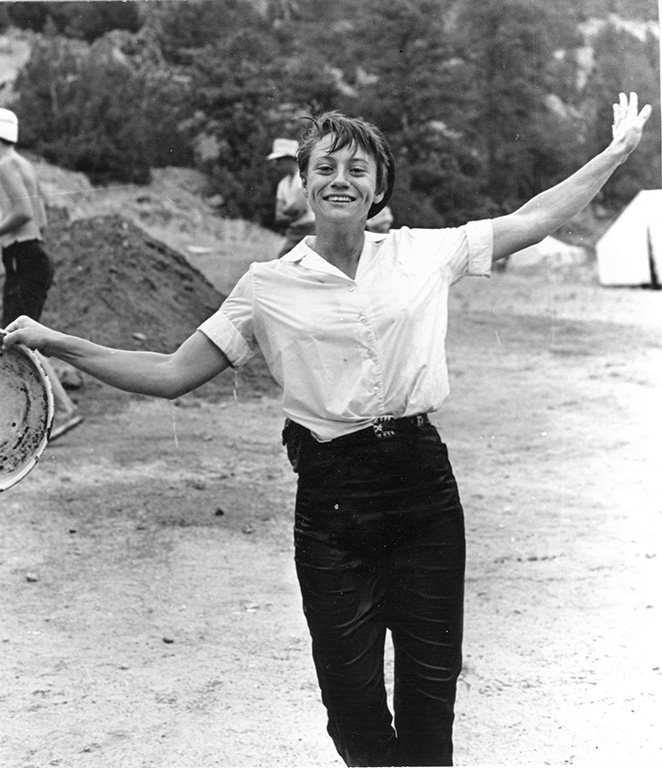
The Department of Anthropology and Applied Archaeology established the Cynthia Irwin-Williams Lecture in 1997 to honor former faculty member Dr. Cynthia Irwin-Williams. A truly remarkable woman, with over 60 publications and 30 years of professional experience, Cynthia is a role model for women who aspire to scientific careers.
Born April 14, 1936 in Denver, Colorado, Cynthia Irwin-Williams developed an early interest in archaeology. When she was only 12 and her brother, Henry, 14, both began working part-time at the Department of Archaeology in the Denver Museum of Natural History (now the Denver Museum of Nature and Science) and were mentored by Dr. H. Marie Wormington. These early years of exposure to science, in a time when women did not regularly attend college, and rarely became scientists, left an impression. Irwin-Wiliams went on to attend and graduate from Radcliffe College with B.A. and M.A. degrees in anthropology, in 1957 and 1958, respectively. In 1963 she received her Ph.D. in anthropology from Harvard University.
Cynthia persevered and quickly made her mark as a professional, having a towering grasp over specialties that ranged from archaeology to related aspects of geology, paleontology, climatology, remote sensing, desertification and desert reclamation. From 1963 to 1964 Cynthia lectured at Hunter College in New York. From 1964 to 1982, she taught at Eastern New Mexico University. In 1978 she was awarded the Llano Estacado Center for Advanced Professional Studies and Research Distinguished Research Professorship. Cynthia served as president of the Society for American Archaeology from 1977 to 1979, only the second woman to hold this position. In 1982 Cynthia became executive director of the Social Science Center, Desert Research Institute of Reno, Nevada. From 1988 until her death in 1990, she held the title of research professor, Quaternary Science Center, DRI.
To honor her many professional achievements, as well as paving the way for later generations of women in the sciences, we bring a speaker to share their recent research. A free evening presentation is included for all faculty, staff, students, and the community.
Cythia Irwin-Williams Lectureship Information
| Year | Speaker | Description |
|---|---|---|
| 1997 | Dr. Linda S. Cordell | Aftermath of Chaos in the Pueblo Southwest |
| 2001 | Dr. Thomas Dillehay | The First Americans: An Interdisciplinary and South American Perspective |
| 2002 | Dr. Stephen Lekson | The New Ancient Southwest |
| 2003 | Dr. Lynne Sebastian | The Awful Truth about Archaeology |
| 2004 | Dr. David Hurst Thomas | Skull Wars Revisited |
| 2005 | Dr. David Meltzer | Back to Where it All Began: A New Look at the Folsom Site |
| 2006 | Dr. Virginia L. Butler | Where Have All the Native Fish Gone? |
| 2007 | Dr. Glenna Dean | In Search of Anasazi Lite: Fermentation in New Mexico Prehistory |
| 2008 | Dr. Douglas W. Schwartz | Researching at the Edge of Splendor: Discovering Grand Canyon Prehistory |
| 2008 | Dr. J. Stanley Rhine | The Real CSI: Forensic Anthropology and the Investigation of Death |
| 2011 | Dr. Patricia L. Crown | Chaco Chocolate: The Recovery of Cacao at Pueblo Bonito, Chaco Canyon |
| 2012 | Dr. Ted Goebel | Ice Age Peopling of America: Do Stones, Bones and Genes Tell the Same Story? |
| 2013 | Dr. Catherine M. Cameron | The Bluff Great House and the Chaco Phenomenon |
| 2014 | Dr. David R. Hunt | Forensic Files of the Smithsonian Institution |
| 2015 | Dr. Bruce B. Huckell | Making Sense of the Mockingbird Gap Clovis Site in the Northern Jornada del Muerto |
| 2016 | Dr. Michael F. Brown | On Unintended Consequences: The Surprising Impact of Missionary Work among the Awajún of Eastern Peru |
| 2017 | Dr. Suzanne L. Eckert | Telling Their Story through Clay: Potters and Identity among the Late Prehispanic Pueblo Peoples |
| 2018 | Dr. Juliet K. Brophy | Discovering Homo naledi: The Newest Species in the Human Line |
| 2019 | Dr. Jack L. Hofman | Regional Archaeology and Intercept Hunting During Paleoindian Time |
| 2020 | Dr. Bonnie Pitblado | Paleoindian Use of the Rocky Mountains: Higher and Earlier than You Thought! |
| 2021 | Dr. Rose Wellman | Confronting Islamophobia through Ethnography |
| 2022 | Dr. Anna Novotny | Ritual Emulation and Ancient Maya Elite Mortuary Traditions During the Classic Period at Cahal Pech, Belize |
| 2023 | Dr. Barbara Mills | From Frontier to Center Place: The Dynamic Trajectory of the Chaco World |
| 2024 | Dr. Kristina Baines | Heritage in the Body: Sensory Ecologies of Health Practice in Times of Change |


